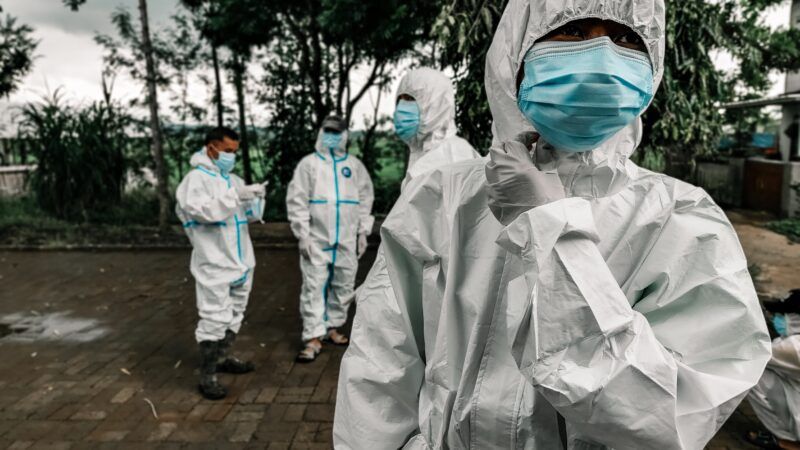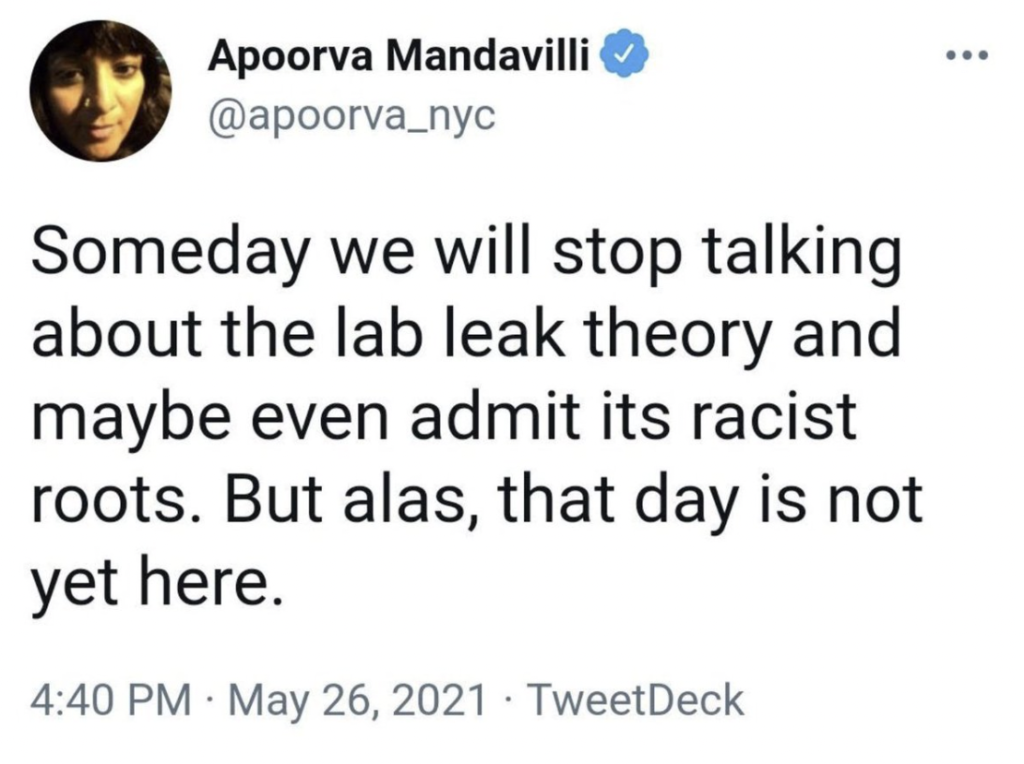U.S. Energy Department Endorses Lab Leak Theory of COVID-19's Origins
The push to label the lab leak thesis a racist conspiracy theory now looks even more foolish.

The U.S. Department of Energy has concluded that the most likely origin of COVID-19 is a lab leak.
The federal agency reviewed new intelligence, which prompted officials to revise their position that it's unclear how the virus emerged. The White House and certain members of Congress also reviewed the intelligence, The Wall Street Journal reports.
The Energy Department's conclusion is made with "low confidence," according to The New York Times, which was quick to point out that "U.S. spy agencies remain divided over the origins of the virus." The FBI previously concluded with "moderate confidence" that intelligence pointed to a lab leak origin; other agencies have been skeptical or undecided.
The shifting consensus on this issue should be a cautionary tale for all the would-be censors who thunderously objected to such talk. In the first year of the pandemic, the idea that COVID-19 might have emerged from a coronavirus research facility in Wuhan, China, was widely branded a racist conspiracy theory. Social media companies such as Facebook vigorously suppressed discussion of the lab leak thesis, partly because U.S. health officials and mainstream news outlets expressed absolute confidence that COVID-19 emerged as a result of zoonotic spillover.
In February 2020, when Sen. Tom Cotton (R–Ark.) said a lab leak was possible, The Washington Post attacked him for "repeating a coronavirus conspiracy theory that was already debunked." The New York Times accused Cotton of spreading a "fringe" idea. CNN said the senator was "playing a dangerous game." PolitiFact gave the lab leak theory a "pants on fire" rating, the most serious level of falsehood on the website's trademarked "Truth-O-Meter." NPR reported that scientists had debunked "the lab accident theory" and that therefore the case was closed.
CNN also chided lab leak believers for subscribing to a "theory that's almost certainly not true," and it criticized President Donald Trump for failing to heed the national intelligence community's views on the matter. (For more examples of media misfires, see this thread from The Washington Free Beacon's Drew Holden.)
In hindsight, it's astonishing how credulously—how gullibly—many journalists bought into obvious Chinese government spin. One of the very worst offenders was Apoorva Mandavilli, The New York Times' lead coronavirus reporter, who lamented in May 2021 that people would talk about a theory with "racist roots."

What was racist about the lab leak theory was never well-explained. In fact, one could plausibly argue that the alternative explanation—that it came from a Chinese wet market—has far more racially problematic implications. After all, if wet markets are responsible for the pandemic, then the culprit is a culturally specific Chinese food custom. The lab leak theory, on the other hand, indicts an organization, the Chinese government, rather than a populace. And unlike the wet market theory, a possible lab origin also calls for scrutiny of U.S. agencies, which have funded coronavirus research on bats in Wuhan, China.
The truth is the truth, and investigators should pursue the origins of COVID-19 no matter where they lead. But if the goal is minimizing anti-Asian animus, there's actually good reason to prefer the lab leak explanation.
Yet trackers of so-called disinformation often labeled lab leak a racist conspiracy theory. Take the Global Disinformation Index (GDI), a British organization that has received funds from the U.S. State Department. Its purpose is to dissuade advertisers from working with news websites that spread incorrect ideas. In practice, GDI has functioned as a kind of blacklist for conservative, libertarian, and alternative news sites. It even flagged Reason as one of America's "ten riskiest news outlets," ostensibly because Reason does not provide "information regarding authorship" (we do), or possibly because we don't explain our fact-checking and correction policies (we have such policies, and they are robust), or maybe because we provide a mostly unfiltered comments section.
Hans Bader, a former attorney for the Education Department, points out that a GDI report on ad-funded COVID-19 disinformation accused news sites of peddling anti-Chinese racism for accusing the Chinese government of covering up a lab leak. Another GDI report warned advertisers against working with sites that "traffic in theories that the Chinese government" should be blamed for the virus's spread.
GDI and other "disinformation" trackers either have to start accusing the U.S. Energy Department of racism or admit that it never made much sense to proactively acquit a notoriously authoritarian, secretive, and untrustworthy foreign government.
Health officials and intelligence experts may not have enough information to conclusively determine COVID-19's origins. But the push to not merely decry the lab leak theory but to actively prohibit discussion of it—as was the case on Facebook—has not aged well. Let people discuss and debate all variety of coronavirus topics, without fear of sanction.
